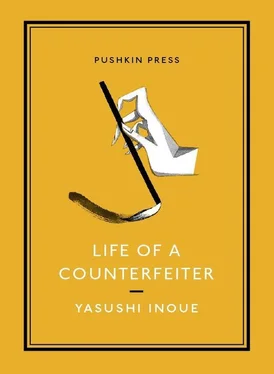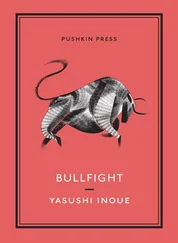Once, after we had left that mountain village behind and moved to a place in the suburbs of Osaka, I happened to mention Hōsen’s ambition — or, if that’s too grand a word, his dream — to my wife. No sooner had I had finished than she grimaced and remarked, “How awful.” The expression on her face suggested she could hardly bear the idea of such a firework.
“Why? What’s so awful about it?”
“I mean… I don’t know how to put it, I just don’t like the thought. A big burst of violet opening against a dark sky.”
Something told me I had touched an emotion better left alone, so I decided not to talk any more about Hōsen and hurriedly shifted the conversation. It was a trivial thing, it meant nothing; and yet my wife’s attitude struck me with all the force of a discovery, utterly unexpected, and the impression lingered. I half understood how she felt, but when I considered it more closely I realized that in fact it really didn’t make sense to me. Perhaps, I thought, whatever it was my wife found so awful was the same thing Hōsen’s widow had noticed inside him that prompted her to leave. Perhaps something in all this surpassed my comprehension, something in the almost physiological revulsion that prevented women from feeling for Hōsen once he become involved with gunpowder, even one who had stood by his side for decades as he earned his livelihood by painting counterfeits.
I myself sensed, in Hōsen’s experiments with gunpowder, something of the dark, cold nature of gunpowder itself. But it did not evoke in me feelings like those my wife and Hōsen’s widow seem to have had. The image of a few violet flowers suddenly blossoming in a dark nighttime sky, which the counterfeiter needed more than anything else at a time when his life lay in shambles around him, struck me, indeed, as possessing a certain mournful beauty.
I doubted Hōsen’s dream had ever bloomed like that against the darkness. Now that he had died, there was no way to ask. I couldn’t help thinking, though, that it was precisely the impossibility of the color of those blossoms that had inspired such intense disgust in the two women.
After that, without my even noticing, Hōsen left my thoughts. It was only natural, I suppose: as time passed, the less-than-cheerful stories of a certain counterfeiter I had chanced to hear in the mountains where my family had fled the war gradually faded from my memory. But in the end, Hōsen was simply biding his time, waiting for the moment, two years after the war ended, when he could rise up before me one last time, as if to bring closure to the tale of his life as I had heard it.
It was summer. For the first time in a year and a few months I was riding the Hakubi line from Okayama to Yonago, over the Chūgoku mountains, to research an article for the Sunday edition about a comprehensive exhibition being held in one of the prefectures in the San’in region, linking it to the issue of provincial cultures. The train pulled up to the platform of the small station at the summit where, shouldering as much luggage as I could bear, I had embarked and disembarked so many times, and I saw the tall weeds that bordered it stirring in the winds sweeping the plateau, and then to the west the red cliffs, from which sand constantly spilled onto the road below, hissing faintly, and it suddenly struck me that it would cause no major difficulties if I were to arrive at my destination one train later. I hesitated for a while, debating whether or not to get off; then, just as the train was preparing to leave, I grabbed my bag from the rack and leapt down onto the platform. The period when my family had lived here being what it was, the area brimmed with all manner of painful memories of a sort I could never experience anywhere else, and, even if I couldn’t make it to the village where we had stayed, I thought it might be nice to spend two hours or so here, drinking in the familiar scenery of the square in front of the station, the houses in the village. If I didn’t jump down now, I would probably never have another chance to get off at this station.
I walked out the gate, wondering if I would bump into anyone I knew, then decided to take a rest and headed for the village’s only restaurant, opposite the station. All of a sudden someone called out behind me in the accent peculiar to the region.
“Hey, aren’t you the guy from the Youth Center?”
Looking back, I realized it was a young man who had chopped firewood for us and was known by the nickname “Uranbe,” the second son at the farm next to the school.
I chatted with the young man for a while. He told me, in a somewhat Reddish tone typical of the time, that before long the exploitation of the farmers would start up again. He never once asked after my family, never mentioned any of the other villagers; I sensed the baffled fury at the age that burned in his breast, and in the breasts of the other young men in these mountains.
“Going up to the village?” he asked.
When I replied that I didn’t have enough time today and asked him to say hello to people, he told me five villages had organized the first fireworks display since the war that evening, and if I could wait two hours lots of folks from the village would be coming to watch — it wasn’t long, why not stick around? So I decided to delay my departure by two trains instead of one. If it meant I’d see the villagers, I wanted to stay and thank them for all the help they had given us when we lived here.
I passed the two hours from three to five in the station’s waiting room and in the restaurant across the square. The utility poles in the square were plastered with posters announcing the fireworks, the writing done, I was sure, by young men from the area — the red calligraphy, bleeding into the paper, was truly terrible. At five, though it was still a little early, I headed for the spot where the young man said the fireworks would be launched, which was part of an enormous field about five or six hundred meters northeast of the station. There was a small river, perhaps four meters across, the embankment of which was the only location in the area suitable for launching fireworks. It was indeed a good place for fireworks; no one would be in any danger here.
A dozen or so fireworks shells, each slightly under a meter high, had been lined up like so many earthenware pipes in the clearing, which was awash with summer grasses. The sight of them poking up above the weeds gave me the strange illusion that I was looking not at fireworks, but at stupas, each one the marker for a grave. Five or six young men were sitting nearby, a boisterous gaggle of children around them. And then I ran into a man I knew from the village. He told me that maybe a hundred meters away, up on the embankment, they had a single set piece ready to go — this was the big draw tonight — and the spectators were supposed to gather beneath the railway bridge a hundred meters up from there. The villagers were sure to be along soon, too.
It must have been too early, though, because no one was around. The sun was still fairly high in the sky, up above the iron bridge.
“Five villages collaborated on the display, it’s true, but ours is the only one involved in the launch,” the man told me. “Used to be an old guy named Hara who made fireworks, and the youngsters learned it from him.”
I hadn’t realized until then that all the young men were from our village.
“Hara Hōsen, you mean,” I said.
“You sure know at lot,” the man said, taken aback.
“Do you think anyone here might have been close to him?”
“Well, I knew him myself, of course… There’s a fellow we call Tassan, though, I guess you might say he was Old Hara’s apprentice, learning to make fireworks.”
The man led me over to this fellow, Tassan, who was in his forties. I didn’t remember seeing him before. I asked why, and it turned out I wouldn’t have because he had been in the military throughout the war and had only been repatriated from the Soviet Union late last year. He had an extremely gruff, even angry tone, but I didn’t get the impression, as we talked, that he was such an unpleasant fellow, and while words didn’t come easily to him he was talkative enough. Evidently he was supervising the display that evening, and as the need arose he kept issuing orders to the young men around him.
Читать дальше












